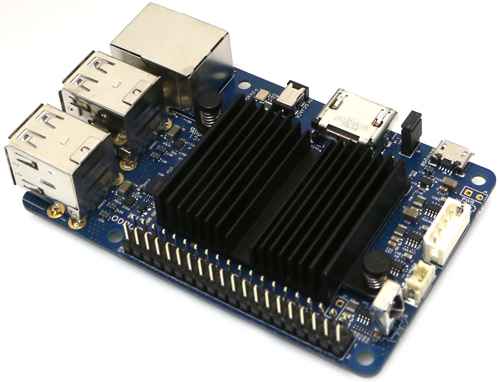ODROID-C1

Overview
The ODROID-C1, ODROID-C1+, and ODROID-C0 boards are well designed boards originally designed for Android OS but works well with Linux based distributions. These boards use an Amlogic S805 processor (called “meson_8b” in the linux kernel). The functionality supported is:
- 2x I²C buses
- 1x SPI bus with 1x chip-enable
- 25x GPIO pins on the main J2 header
Support
The ODROID-C1, ODROID-C1+, and ODROID-C0 boards are supported when running a linux based distribution.
periphis tested with a minimal (head-less) Ubuntu 16.04 build
Drivers
- Headers driver lives in
periph.io/x/host/v3/odroidc1.
It exports the main
J2header, which is rPi compatible except for a couple of analog pins (which are not currently supported). - sysfs driver lives in periph.io/x/host/v3/sysfs.
Tips and tricks
The ODROID-C1+ is described on Hardkernel’s web site: ODroid-C1+. The best reference for actually using the various I/O buses is the wiki: Hardware wiki.
The drivers and some of their peculiarities are described in the Ubuntu section of this wiki page.
Configuration
GPIO
Currently no package for memory-mapped I/O has been written for the Amlogic S805 processor, thus all gpio functions are implemented via sysfs.
Interrupts on GPIO pins are limited to 8 pins when using rising or falling edges and 4 pins when using both edges.
I²C
By default, I²C is not enabled. Enable with: modprobe aml_i2c
I²C #1 is on pins 3&5, I²C #2 on pins 27&28. I²C #0 is not usable.
This needs to be done at each boot. A good location is to add the above into
/etc/rc.local before the exit 0 statement.
SPI
By default, SPI is not enabled. Enable with: modprobe spicc
Bus on pins 19, 21, 23 and chip enable pin 24.
This needs to be done at each boot. A good location is to add the above into
/etc/rc.local before the exit 0 statement.
1-wire
1-wire driver is loaded by default. To free up GPIO #83 from 1-wire: rmmod w1-gpio
Buying
- The ODROID-C1 is directly distributed by HardKernel.
The periph authors do not endorse any specific seller. These are only provided for your convenience.
 Edit this page
Edit this page